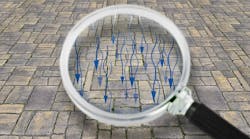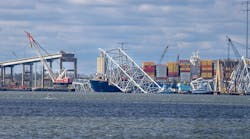A major shipping and industrial property hub on the U.S. West Coast, the Port of Vancouver USA owns property spanning 2,127 acres in the Vancouver Lake lowlands, which includes more than 800 acres of industrial and marine operations and 94 acres of waterfront property on the Columbia River, and is bordered by several neighborhoods. More than 50 manufacturing and light industrial tenants have made their homes at the port.
Creating sustainable solutions to environmental issues is part of the port’s core mission to ensure a healthy community from every angle. A central force in southwest Washington’s economic vitality, the port’s staff believes stewardship and a thriving economy go hand in hand, and has been guided by a dedication to both for more than 100 years. The port strives to create programs designed to meet or exceed regulatory requirements in the construction and operation of its facilities and delivery of its services. One recent invention created by port staff members exemplifies the creativity that goes into solving local ecological issues.
A New Solution
An important aspect of the port’s environmental policy is a commitment to the health of the nearby Columbia River and the wildlife it supports. With that in mind, in 2008, Matt Graves, the port’s environmental manager, and Mary Mattix, port environmental program manager, began looking for ways to reduce the amount of zinc in storm water. The presence of the metal is caused by galvanized metal roofs and downspouts on tenant facilities. Through a series of inventive and successful experiments, the team created an innovative answer.
The Grattix (named after Graves and Mattix) is a small, self-contained, yet effective storm water filtration system. Simple to build and economical to operate, the Grattix functions as a “rain garden in a box.” It is constructed using a large plastic drum or tote, drain rock, screening, pea gravel and an underdrain piping system. The top of the container then is filled using a sand filter and a sand and compost layer. Lastly, plantings of rushes and sedges are added, along with bark mulch and large cobbles that form a splash pad.
“We conducted a pilot study of the Grattix from 2008 to 2011, in which our environmental team collected inlet and outlet samples of storm water,” Graves said. “We were excited to learn that they continuously found 90% to 95% zinc reduction.”
Effective in maintaining the health of the river and wildlife, the Grattix also is simple and inexpensive to maintain, requiring only periodic replacement of the mulch layer.
Best Practices
As a public agency with a directive to create economic benefit for the community, the port and its environmental team spread the word about the advantages of the Grattix to others in need of innovative storm water treatment options. The result: Other public agencies, ports and private sector companies throughout the region have found the Grattix to be effective and economical. It made such an impression, in fact, that it was featured in a video created by the Washington Stormwater Center titled, “Innovative Stormwater BMP, the Grattix,” to help local companies and individuals navigate the complexities and realize the rewards of storm water management.
“We are thrilled that the Grattix is being recognized as being effective,” Mattix said. “But we are even more pleased that a growing number of public and private entities—such as Kitsap County Public Works, Sapa Profiles, the Port of Olympia and Wilco-Winfield LLC—also plan to use the system.”
The port’s environmental team is eager to share its insights about the system and has hosted several storm water treatment demonstrations for local community members, offering construction tips and advice on where to source inexpensive materials locally.
“The health and safety of our environment is a high priority at the Port of Vancouver,” Graves said. “We hope this encourages others to investigate and install effective and sustainable solutions for the health of waterways and wildlife.”
Patty Boyden is director of environmental services for the Port of Vancouver USA. Boyden can be reached at [email protected].
Download: Here


